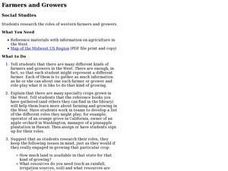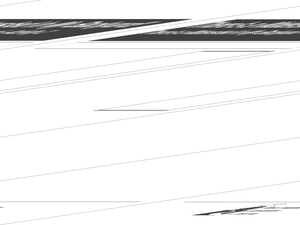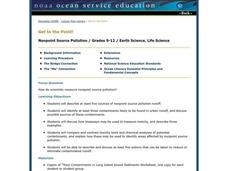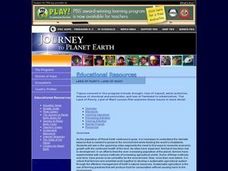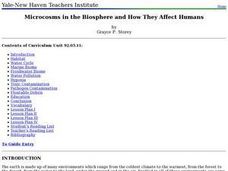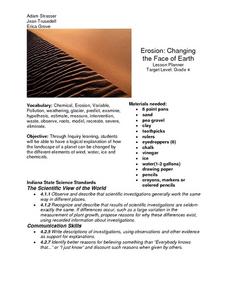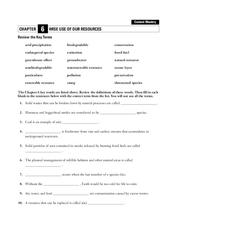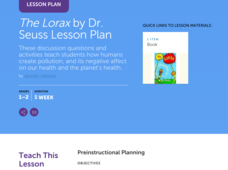School Improvement in Maryland
Smart Growth
New roads, new businesses, new developments, new mass transit systems. All growth has both positive and negative effects on communities. Government classes investigate the principles of Maryland's 1997 Smart Growth program and the...
Curated OER
Environmental Education
Second graders examine how their choices affect the environment. They identify different types of pollution and its source. They ask questions to end the lesson.
Curated OER
What's Gotten Into You?
Students use models to investigate the process and consequences of water contamination on the land, groundwater, and plants.
Curated OER
No magic borders
Learners discuss what they have heard about pollution. They explore the purposes and limitations of political boundaries and borders and identify some of the causes and effects of pollution.
Curated OER
Farmers and Growers
Students explore the lives and work of the farmers and growers of specialty crops of the West. The amount of land and natural resources needed, the fertilizers utilized, and the market available for the crops are investigated in this...
Curated OER
Clean Kansas Water
Students gain an understanding of ways we can be responsible custodians of our water supply. Students explore the governor's clean water initiative involving the Lower Kansas/Republican river basin and the pollutants present there.
Curated OER
The Water in Our Lives: Kit Practice
Learners examine a local water source using testing kits to determine water qualitiy. They identify the pollutants and contaminants in each sample. They determine if samples fall within an acceptable range for drinking water.
Curated OER
The Five Finger Exercise
Students understnad the importance of keeping our rivers and streams pollution free by remembering the major rivers of northeast Kansas. The see how the rivers contain particles of every substance that drains into them.
Curated OER
A River Ran Wild
Students describe and illustrate pollution and how to clean up pollution. They display their solutions by creating posters, signs, bumper stickers, slogans, T-shirt designs, commercials and poetry. This lesson ties in with 'A River Ran...
Curated OER
There's a Watershed in my Backyard!
Students explain what the term watershed is by creating a model. In this science, geography lesson, students demonstrate how the water moves in a watershed. Additionally, students learn about point source and nonpoint source pollution....
Curated OER
Get to the Point!
Students write out sources of pollution and identify contaminants are most likely found in urban runoff. In this pollution lesson students compare toxicity tests and chemical analysis of potential contaminants.
Curated OER
Problems with Rivers
Students explore the PNI model. In this river pollution lesson plan, students use the PNI (positive-negative-interesting) problem solving model to analyze 5 scenarios.
Curated OER
Land of Plenty, Land of Want
Students view a video about the state of the environment. They discover the topic of sustainable agriculture. They identify problems and how to solve them.
Curated OER
Importance and History of Ecological Conservation
Discuss and analyze a variety of information regarding the history of ecological conservation and preservation, as well as its importance. Scholars work in groups to complete four different activities, then report back to the class for a...
Global Oneness Project
Living with Less Water
Did you know that California produces two thirds of the fruits and nuts consumed in the United States? That it produces almost one third of the vegetables? Did you know that scientists warn that California is facing the onset of a...
Curated OER
Runoff: Intro to Watersheds
Students are taught that a watershed is, what types of basic land cover are impermeable and permeable to water. They trace the flow of water around their school and around their home. Students determine what watershed their school is a...
Curated OER
Science: Microcosms in the Biosphere
In a series of lessons, examine the impact on humans by microcosms in the biosphere. Among the plans structured for students with different abilities and learning styles, are activities describing the symbiotic relationship, drawing the...
Curated OER
Utah's Own
Fourth graders examine the effects of humans on the environment. In this Social Studies lesson plan, 4th graders analyze human changes to the environment. Students explore the actions and effects at a community level.
Curated OER
Erosion: Changing the Face of Earth
Fourth graders explore how the landscape of the planet can be changed by different elements of wind, water, ice and chemicals through hands-on activities. They examine pictures of areas around town and discuss anything they think is out...
Curated OER
Energy Resources
In this energy resources activity, students read about the greenhouse effect and global warming. Then they explain why scientists are so concerned with greenhouse gases. Students also describe how global warming affects people worldwide.
Curated OER
Wise Use of Our Resources
For this resource review worksheet, students will review the definition of key vocabulary words and then fill in the blank with the correct term in 10 sentences.
Scholastic
The Lorax by Dr. Seuss Lesson Plan
Celebrate the whimsical world of Dr. Seuss with a lesson that features the memorable tale of The Lorax. After listening to a riveting read-aloud, scholars take part in a grand conversation about the story and environment. Then they...
Illinois Department of Natural Resources
Section Four: How Can We Protect Biodiversity?
Look into the future with a lesson plan on biodiversity and natural habitats. Learners read articles about different perspectives when it comes to planning future development, and decide which angle is the highest priority in a group...
NOAA
The Dead Zone
The fifth installment of a 23-part NOAA Enrichment in Marine sciences and Oceanography (NEMO) program defines dead zones and how they form. Pupils then examine data from the Gulf of Mexico to determine dead zone formation.
Other popular searches
- Causes Land Pollution
- Environmental Land Pollution
- Land Pollution Recycling
- Land Pollution Solutions
- Effects Land Pollution
- Effects of Land Pollution
- Water Land Air Pollutants
- Land Pollution Lesson Plans
- Prevention of Land Pollution
- E Waste Land Pollution






